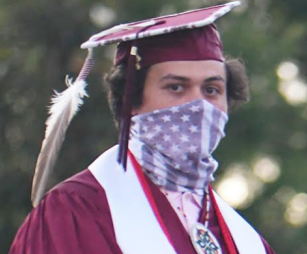
- Details
- By Levi Rickert
CHOCTAW, Miss. — American Indian students in Mississippi no longer have to worry about wearing regalia or other cultural objects, such as an eagle feather on their caps, at graduation ceremonies.
Senate Bill 2595, also known as the Tribal Regalia Bill, was signed into law by Mississippi Gov. Tate Reeves late last month and went into effect on July 1.
The new regalia law recognizes the Mississippi Band of Choctaw Indians as the only federally recognized tribe in Mississippi and acknowledges the tribe’s unique cultural heritage. The law states that a government entity may not prohibit an individual––a member or descendent of a federally recognized tribe––from wearing traditional regalia or objects of cultural significance at a public event including, but not limited to, an award ceremony, graduation or public meeting.
Mississippi Band of Choctaw Indians and Tribal Chief Cyrus Ben, who worked on getting the bill approved by the Mississippi State Legislature, hailed the bill’s passage and signing as a true testament to the strong government-to-government relationship it has with state officials.
“This has been an interest of mine for many years. I have worked on this project for two years and had the opportunity to speak with local officials and work hand-in-hand with our state representatives to ensure this bill’s passage,” Ben said. “I thank Representative Scott Bounds for his leadership in the State House and Senator Jenifer Branning for sponsoring this bill and to all those who voted to pass this bill.”
Ben added that the bill is a giant step toward protecting the Choctaw people’s right to show “our love and pride for our culture, no matter where we might be.”
Senate Bill 2595 was introduced in February 2020 and was voted on in both the Mississippi Senate and House on June 23, 2020. Gov. Reeves signed the bill on June 29, 2020.
More Stories Like This
Native News Weekly (August 25, 2024): D.C. BriefsUS Presidents in Their Own Words Concerning American Indians
Native News Weekly (December 21, 2025): D.C. Briefs
Native America Celebrates the Winter Solstice
Tlingit & Haida Launch New Foundation to Support Education, Wellness
Help us defend tribal sovereignty.
At Native News Online, our mission is rooted in telling the stories that strengthen sovereignty and uplift Indigenous voices — not just at year’s end, but every single day.
Because of your generosity last year, we were able to keep our reporters on the ground in tribal communities, at national gatherings and in the halls of Congress — covering the issues that matter most to Indian Country: sovereignty, culture, education, health and economic opportunity.
That support sustained us through a tough year in 2025. Now, as we look to the year ahead, we need your help right now to ensure warrior journalism remains strong — reporting that defends tribal sovereignty, amplifies Native truth, and holds power accountable.
 The stakes couldn't be higher. Your support keeps Native voices heard, Native stories told and Native sovereignty defended.
The stakes couldn't be higher. Your support keeps Native voices heard, Native stories told and Native sovereignty defended.
Stand with Warrior Journalism today.
Levi Rickert (Potawatomi), Editor & Publisher

